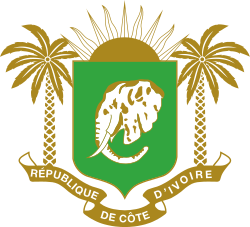| | |||||||||||||||||||||||||
| |||||||||||||||||||||||||
66 of 99 seats in the Senate 50 seats needed for a majority | |||||||||||||||||||||||||
This lists parties that won seats. See the complete results below.
| |||||||||||||||||||||||||
 |
|---|
Senatorial elections were held in Ivory Coast on 16 September 2023. [1] [2]
| | |||||||||||||||||||||||||
| |||||||||||||||||||||||||
66 of 99 seats in the Senate 50 seats needed for a majority | |||||||||||||||||||||||||
This lists parties that won seats. See the complete results below.
| |||||||||||||||||||||||||
 |
|---|
Senatorial elections were held in Ivory Coast on 16 September 2023. [1] [2]
Members of the electoral college were renewed in the 2023 Ivorian local elections on 2 September 2023, with a landslide victory for the ruling RHDP. [3]
Senators are elected by members of municipal, autonomous districts and regional councils. In each region and autonomous district, two senators are elected by the members of this electoral college, while the president nominates a third one. The Senate thus has a total of 99 senators, 66 elected and 33 nominated. [4]
 | ||||||
|---|---|---|---|---|---|---|
| Party | Votes | % | +/– | Seats | +/– | |
| Rally of Houphouëtists for Democracy and Peace | 6,404 | 74.63 | -3.67 | 58 | +8 | |
| PDCI–RDA | 1,061 | 12.36 | New | 6 | +6 | |
| PDCI–RDA–PPA–CI joint list | 202 | 2.35 | New | 0 | – | |
| African People's Party – Côte d'Ivoire (PPA–CI) | 106 | 1.24 | New | 0 | – | |
| Ivorian Popular Front (FPI) | 56 | 0.65 | New | 0 | – | |
| Independents | 752 | 8.76 | -12.94 | 2 | -14 | |
| Nominated senators | 33 | – | ||||
| Total | 8,581 | 100.00 | – | 99 | – | |
| Valid votes | 8,581 | 98.87 | ||||
| Invalid votes | 51 | 0.59 | ||||
| Blank votes | 47 | 0.54 | ||||
| Total votes | 8,679 | 100.00 | ||||
| Registered voters/turnout | 9,535 | 91.02 | ||||
| Source: CEI | ||||||